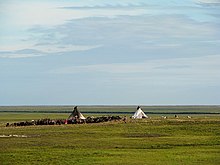Nomadic peoples of Europe

True nomadism has rarely been practiced in Europe in the modern period, being restricted to the margins of the continent, notably Arctic peoples such as the (traditionally) semi-nomadic Saami people in the north of Scandinavia,[1] or the Nenets people in Russia's Nenets Autonomous Okrug.[2] In ancient and early medieval times, Eurasian nomads dominated the eastern steppe areas of Europe, such as the Scythians, Huns, Avars, Pechenegs, Cumans or Kalmyk people in Russia's Kalmykia.[3]
Historically, at least until the Early Middle Ages, nomadic groups were much more widespread, especially in the Pontic steppe of Eastern Europe (part of Europe in the contemporary geographical definition, but as part of the Eurasian Steppe historically considered part of Asian Scythia).[4] The last nomadic populations of this region (such as the Kalmyk people, Nogais, Kazakhs and Bashkirs) became mostly sedentary in the Early Modern period under the Russian Empire. Seasonal migration over short distance is known as transhumance (as e.g. in the Alps or Vlachs in the Balkans) and is not normally considered "nomadism".[citation needed]
Sometimes also described as "nomadic" (in the figurative or extended sense) is the itinerant lifestyle of various groups subsisting on craft, trade or seasonal labour rather than on livestock.[5] Romani people and Irish Travellers are the best known of these.[6] See itinerant groups in Europe for those.
See also
[edit]- Vagrancy (people)
- Crimean–Nogai raids into East Slavic lands
- Nomadic tribes in India
- Itinerant groups in Europe
References
[edit]- ^ Solbakk, John T. "Reindeer husbandry – an exclusive Sámi livelihood in Norway" (PDF). www.galdu.org. Archived from the original (PDF) on 27 September 2007. Retrieved 10 August 2007.
- ^ Forbes, Bruce C.; Stammler, Florian; Kumpula, Timo; Meschtyb, Nina; Pajunen, Anu; Kaarlejärvi, Elina (2009-12-29). "High resilience in the Yamal-Nenets social–ecological system, West Siberian Arctic, Russia". Proceedings of the National Academy of Sciences. 106 (52): 22041–22048. doi:10.1073/pnas.0908286106. ISSN 0027-8424. PMC 2791666. PMID 20007776.
- ^ Tikhomirov, Andrey (2022-05-15). Povos românicas. Migrações indo-européias. Litres. ISBN 978-5-04-229976-6.
- ^ Costa, Wanderley Messias da (2008). Geografia Política e Geopolítica:Discursos sobre o Território e o Poder (in Brazilian Portuguese). EdUSP. ISBN 978-85-314-1074-1.
- ^ Oxford English Dictionary: "nomad, n.: "A member of a people that travels from place to place to find fresh pasture for its animals, and has no permanent home. Also (in extended use): an itinerant person; a wanderer." (emphasis not in original)
- ^ Nogueira, Adeilson (2019). Ciganos, A História De Um Povo (in European Portuguese). Clube de Autores.
Text is available under the CC BY-SA 4.0 license; additional terms may apply.
Images, videos and audio are available under their respective licenses.
